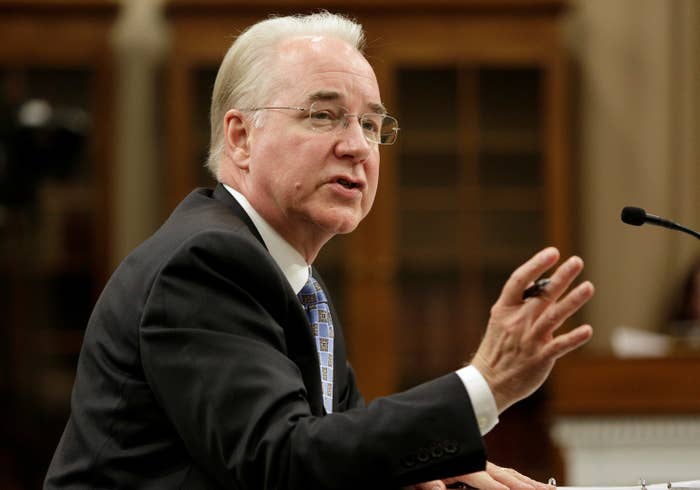
WASHINGTON — President Donald Trump's plan to slash funding for biomedical research and public health agencies drew fury from lawmakers at a Congressional hearing on Wednesday.
But Health and Human Services secretary Tom Price defended the proposed 18% cut to his $80 billion agency before a subcommittee of the House Appropriations Committee.
“Our goal is to fashion a budget that focuses on the things that work and try to decrease the areas where there are duplications or redundancies,” Price said, adding that the goal included “a larger return for the taxpayer.”
Price said that a “need for efficiency” at the National Institutes of Health, which HHS oversees, in part drove the proposed $5.8 billion cut to the $32 billion research titan. The “skinny budget” proposes a $15.1 billion cut overall to the Department of Health and Human Services, the agency with purview over the Food And Drug Administration, Centers for Disease Control and Prevention, and the Surgeon General.
Rep. Rosa DeLauro of Connecticut called the plan “untenable.”
“I think it is a disaster that will have life and death consequences to American families,” she said, adding that the cuts would “decimate the National Institutes of Health” and “turn back the clock on life saving biomedical research.
Her colleague on the panel, New York Rep. Nita Lowey, said that “the few clear details will have catastrophic results for Americans.”
The audience included advocates for the Alzheimer’s Association who were visiting the Capitol to petition Congressmen to increase federal funding to study the disease.

The NIH spends over $30 billion in medical research annually, and is the second largest funder of US research after the Department of Defense. It is the largest US funder of disease research.
The White House budget proposal introduced earlier this month drew backlash from advocacy groups that represented patients, scientists, and doctors, alike.
“I was concerned that the Trump administration already knows that they want to cut 18% of the NIH budget, without, according to Secretary Price today at the hearing, knowing what it is that they want to cut,” Kevin Wilson, director of public policy at the American Society for Cell Biology, told BuzzFeed News.
“I’m concerned that what they’re going to end up doing is make the programs fit the cut instead of the other way around,” Wilson said.
Price singled out grant money used for administrative expenses, or overhead, as an example of waste at the NIH.
“I was struck by one thing, that is that about 30% of the grant money that goes out is used for indirect expenses … other than the research being done,” Price said. “That’s an amount that would cover much more than the reduction that’s being proposed.”
The NIH does not determine the rate of indirect spending, according to NIH spokesperson Renate Myles. Rather, that is the task of a division at HHS, which negotiates rates with universities and other institutions who are awardees.
In a statement to BuzzFeed News, Myles clarified that in 2014, 2015 and 2016, 27.5% of NIH grant funding went toward indirect costs.
A 2011 letter from the Federation of American Societies for Experimental Biology (FASEB) to the NIH did estimate that indirect costs included in its grants averaged about 30%, complaining that university administrators were taking money from lab work.
But Wilson said that such spending was a “necessity to doing research.” Fights over excessive overhead charges by universities tagged onto NIH grants were hotly debated in the early 1990’s, leading to hearings and a wave of reforms. More recently, the Obama administration tried to limit university overhead charges, but made little headway.
At the same time, NIH grant winners saw their funding cut 4.7% by the budget fights between Congress and the Obama administration in 2013. And more than 600 disease research grants were never awarded because the fight.
Rep. Mike Simpson of Idaho, asked the secretary if the “reorganization” of the NIH proposed in the White House budget would include a refocusing of priorities at the agency. Last year, for example, NIH chief Francis Collins had spoken about shifting money from HIV research to Alzheimer's.
Price replied that it could be a bit of both. “We haven’t made a pre-supposition of what the endpoint is in all of this,” Price said.
“I am glad to see there was pushback against the cuts. That’s a good sign,” Jennifer Zeitzer, director of legislative relations at FASEB, told BuzzFeed News.
Zeitzer said she would look to a fuller version of the budget to fill in some nagging questions.
“What exactly does he mean by inefficiencies?” she said, adding that some degree of replication is critical to the scientific method. “You can’t just fund one breast cancer study to get all the answers.”
UPDATE
This article was updated to include a statement from the NIH.
